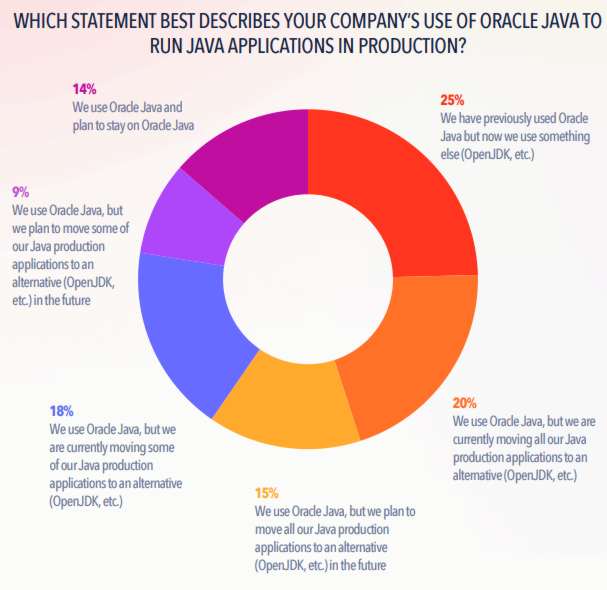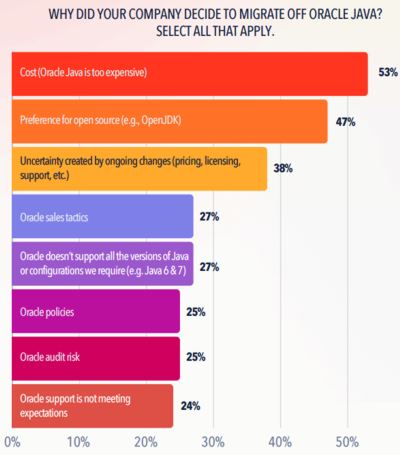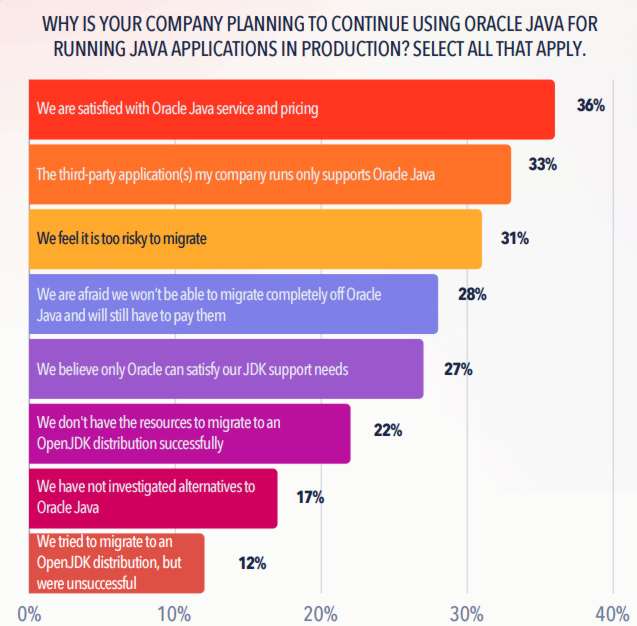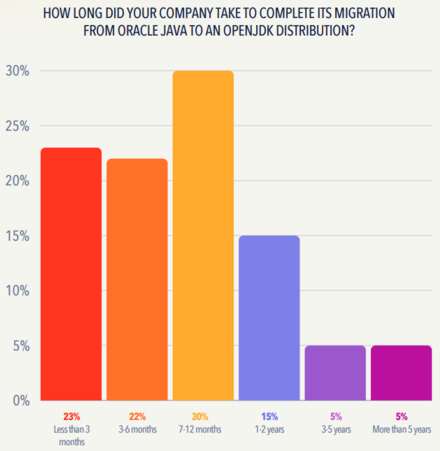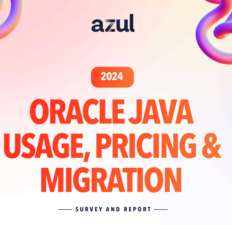| Azul Reports On Java Migration |
| Written by Sue Gee |
| Wednesday, 31 July 2024 |
|
As a reaction to changes in pricing and uncertainty over its policies, Java professionals are migrating away from Oracle and embracing open source JDKs in preference. Azul, the only company 100% focused on Java has investigated this trend with a survey.
The question of whether Java is a waning technology is one that we have considered several times over recent years, finding reports of its decline greatly exaggerated. What is clear, however, is that the exclusive use of Oracle Java has substantially decreased and this is trend that accelerated when Oracle altered its pricing model in 2023, see Oracle Hikes Java Prices and our coverage of the Azul State of Java Survey and Report 2023. Having exposed the effect of Oracle’s pricing change in its wide-ranging 2023 survey, Azul followed up this year with a report dedicated to Oracle Java Usage, Pricing and Migration which is based on responses to on online survey from 633 experienced Java professionals worldwide, but predominantly from the United States and Canada. Respondents ranged from development team members to C-level executives in companies with at least 100 employees. The headline finding of the report is that 86% of Oracle Java users are migrating away from it. However the scenario isn't quite as clear cut as this chart reveals:
So far only 25%of respondents, having previously used Oracle Java now use an alternative Java distribution exclusively, and another 35% are either in the process of moving away from Oracle entirely or are planning to do so. Another 27% are making or planning to make a partial move, leaving only 14% planning to stay exclusively with Oracle Java. Respondents who had or were planning to adopt alternative Java distributions were asked their reasons for migrating away for Oracle: Cost emerged as the top reason for leaving Oracle, with 53% of respondents selecting it as a contributory factor but preference for an open source JDK came a close second. The third most prevalent reason was uncertainty created by Oracle's ongoing changes in pricing,licensing, support,etc. Over a quarter of respondents had migrated because Oracle no longer supports the versions or configurations companies still require. All the remaining reasons reflected dissatisfaction with Oracle - its sales tactics, its policies, shortcomings in its support and the threat of a Java audit. The survey investigated reasons for staying among the 14% of participants and the top response, hardly a reason more a justification, was to do with cost - satisfaction with Oracle service and pricing: More convincing reasons for not leaving Oracle were also given. More than a third of respondents used third party applications that were only supported by Oracle and more than a quarter felt that only Oracle could satisfy their JDK support needs. Other reasons frequently cited were the risks in migrating, lack of resources to do so and concern that they might end up still paying Oracle by virtue of an incomplete migration. A small proportion (17%) hadn't investigated alternatives to Oracle Java while an even smaller proportion (12%) had tried to migrate and failed. On the whole companies that had moved from Oracle to an OpenJDK distribution were happy with that experience and found it to be quicker than they might have expected: According to the report, 84% of respondents who have already migrated off Oracle Java report the process was easier than, or went as anticipated and that 75% completed their migrations in less than 12 months. Summing up Scott Sellers, co-founder and CEO at Azul commented: “The exodus away from Oracle Java is driven by mounting concerns over pricing changes and a growing preference for open-source alternatives. While some organizations initially hesitated to make the switch, our survey reveals that those who have migrated to OpenJDK distributions have had a positive experience. It's clear that the Java community is voting with its feet, seeking more cost-effective, flexible and open solutions for their Java applications and Java-based infrastructure.” More Information2024 Oracle Java Usage, Pricing and Migration Survey and Report Related ArticlesAzul Reports On State of Java 2023 Oracle's Java Losing Out To Amazon's Oracle Updates License To Make JDK Free |
| Last Updated ( Wednesday, 31 July 2024 ) |


